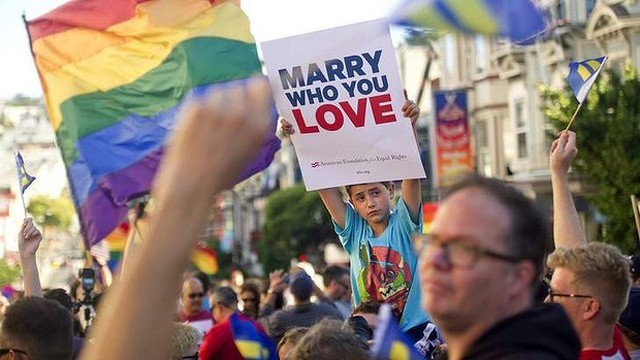Next week my partner and I are heading to the US.
We plan to marry in New York.She’s American and I’m Australian and we are beneficiaries of the US Supreme Court’s recent decision to strike down the Defence of Marriage Act – a ruling that has made available more than 1000 federal benefits previously denied same-sex couples and which will have a real practical effect on the lives of millions of people within America and internationally.
Most important for us is the newly gained ability for gay Americans to sponsor their foreign partners for a green card, giving them the option to live permanently in the US.After celebrating our nuptials, my partner and I will exit the US through customs and immigration as a legally recognised, married couple. Twenty-four hours later, we will enter Australia, our current home, just as we left it – as de factos.
Due to the Marriage Amendment Act of 2004, it is enshrined in Australian federal law that marriage is a union between a man and a woman, and same-sex marriages solemnised in foreign countries are not recognised here.
The language of Australia’s Marriage Amendment Act is strikingly similar to that of DOMA, overturned last week on the grounds that it actively sought to ”disparage” and ”injure” all those who enter same-sex marriages and in doing so worked to ”demean” and ”humiliate” same-sex couples and ”the tens of thousands of children being raised by them”.
My partner and I spent the first six years of our eight-year relationship in the US but moved to Australia because we wanted to live in a country where we could both have secure lifelong residency.
When we moved here, we were so overjoyed to be in a country where we could enjoy most (not all) of the same rights as straight, bi-national couples, that having access to the word ”marriage” seemed unimportant.
We felt so grateful to have those rights we were denied in the US that asking for more seemed almost presumptuous.
But now I’m about to have the experience of getting married elsewhere and having that marriage invalidated as I return home, I no longer see it that way.
I’ve realised that just as the legal rights that come along with marriage are important, so too is the right to use the word marriage if you so choose.
When same-sex marriage is discussed, people often ask me: ”Marriage is such a traditional, gendered, capitalist institution, why would you even want to be part of it?”
But that question relies on the idea that the fight for gay marriage is only about the right to be included in that admittedly flawed institution, to be able to wear white dresses or have whatever is the gay version of a hens’ or bucks’ night.
Although for many gay people those are traditions they would like to participate in, for others the fight for gay marriage is about something different.
For my partner and I, it’s not about wanting to be part of an institution that is, in many ways, very problematic.
It’s about wanting not to be actively excluded from it.
It’s about not wanting gay people in generations that follow ours to have the experience of having their own government tell them their relationship is less than. It’s about the prospect of being parents who need to explain to their child: ”Yes, your parents’ relationship is equal to straight parents’ relationships. It’s just not considered that way by the law.”
It’s about wanting to see the dissolution of federal laws that actively discriminate.
When we look at this issue in Australia, we often see gay people and their allies as the active agents within it. We see activists, gay families and progressive politicians getting out there to fight for same-sex couples.
But there are two active agents in this fight and the reason gay people can’t get married is not just because it’s ”the way it is”. It’s because politicians and the Australians who have elected them have actively stopped same-sex unions from being treated equally.
Like DOMA in the US, marriage law in Australia seeks to actively exclude gay people; in doing so it causes great harm.
It harms those of us who are completely out in our communities and who have learnt our whole lives to steel ourselves against homophobia, no matter whether it comes from a catcall on the street or from the Australian legislature.
And it harms those young people who are having their first realisation that they might be gay and are looking out to the world to see if that’s OK. That harm is being enacted every day in the name of the Australian people.
A common phrase used in this debate is: ”This change is inevitable.” But the kind of momentous change we witnessed in the US last week doesn’t come by itself.
It comes when brave people step up to fight laws they see as unjust and say: ”No more. Not in our name!” Likewise, things stay the same when people actively keep them that way.
We have an election coming up. Let’s follow the US and make this issue a priority.
Bec Zajac is a Brunswick-based writer and radio broadcaster.
Author: Bec Zajac
Publication: The Age
Date: 5 July 2013

